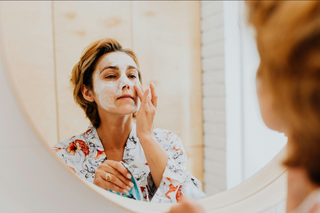For months, you have been mindful of everything you put into your body—cutting back on caffeine, steering clear of sushi, and avoiding alcohol. While expectant and new mothers are often vigilant about what they eat and drink, it is easy to overlook the impact of other products we use daily, like skincare. What you apply to your skin can be as important as what you consume, especially when safeguarding your baby’s health.
To help you navigate this, we have put together a guide on skincare products to avoid while breastfeeding, ensuring you and your little one remain safe and healthy.
Why Ingredient Awareness Matters
Understanding the impact of skincare ingredients is especially important during the breastfeeding journey. The products you apply to your skin can be absorbed into your bloodstream and are directly involved in producing the nourishing milk your baby relies on. This means that certain substances, especially those applied near the chest, could potentially make their way into your breast milk, affecting your baby’s delicate and developing system.
Fortunately, the body has natural defences, like the Blood-Milk Barrier, which helps to protect your baby from harmful substances. However, it is still important to be mindful of the skincare products you use. Since your baby often nestles close during breastfeeding, products applied to your neck, chest, or stomach can easily come into contact with their sensitive skin.
Skincare Ingredients to Avoid While Breastfeeding
Retinoids (Vitamin A Derivatives)
Retinoids, such as retinol and tretinoin, are widely used in anti-ageing and acne treatments. These ingredients are popular because they stimulate collagen production and help reduce the appearance of wrinkles and fine lines. However, while these benefits make retinoids highly sought after in skincare, they are not safe for breastfeeding mothers.
Retinoids can be absorbed into the bloodstream in small amounts, as noted in a study published by the NIH. While it is not definitively known whether this absorption causes toxicity in a breastfeeding baby, it is always best to consult with your healthcare provider before using products containing retinoids.
High levels of vitamin A, which retinoids are derived from, have been linked to birth defects and developmental issues. Even though retinol is a topical vitamin and generally not absorbed deeply into the bloodstream, the risk lies in skin-to-skin contact with your baby. If applied to areas like the face and neck, retinol can cause irritation, redness, dryness, and itchiness in your baby.
For mothers seeking similar skincare benefits, it is advisable to avoid retinol skincare during breastfeeding. Instead, consider using products containing bakuchiol, a plant-based alternative that provides anti-ageing effects without the risks associated with retinoids.
Salicylic Acid
Salicylic acid is a common ingredient in acne treatments and exfoliants, known for its ability to unclog pores and reduce breakouts. While it is generally considered safe during breastfeeding, especially in low concentrations, caution is still necessary.
Although there is no research indicating that high concentrations of salicylic acid (above 2%) pose direct health risks to a breastfeeding baby, it is recommended to avoid applying it to areas that might come into direct contact with your baby’s skin. This precaution is based on advice from sources like Drugs.com, which notes that while salicylic acid is unlikely to be significantly absorbed or appear in breast milk, it is best to avoid application to areas that your baby might touch or ingest. If you are concerned, you might opt for alternatives like benzoyl peroxide or glycolic acid (in lower concentrations), which are safer for breastfeeding mothers and less likely to cause irritation.
Hydroquinone
Hydroquinone is a well-known ingredient that lightens dark spots and treats skin conditions like melasma and hyperpigmentation. It works by reducing the production of melanin, the pigment that gives our skin its colour. While it can be very effective, it is important for breastfeeding mothers to approach it with caution.
The main concern with hydroquinone is its potential absorption into the bloodstream and passage into breast milk. Although hydroquinone is not officially contraindicated during breastfeeding, a statement shared by Drugs.com suggests that long-term use may not be advisable for nursing mothers due to the unknown effects on the baby. Additionally, hydroquinone can make your skin more sensitive to the sun, which could be problematic for both you and your baby.
Because of these uncertainties, it is best to avoid hydroquinone while breastfeeding. Instead, consider using gentler, natural alternatives like vitamin C, kojic acid, or licorice extract. These options can help brighten your skin safely and are better choices when looking for skincare products to avoid while breastfeeding.
Formaldehyde and Formaldehyde Releasers
Formaldehyde is often used in skincare products as a preservative, though it is not added in its pure form. Instead, some products contain compounds known as formaldehyde releasers, which slowly release small amounts of formaldehyde to help maintain the product’s freshness.
While these ingredients serve a purpose, it is important to be mindful of their potential effects, especially during breastfeeding. According to the Agency for Toxic Substances and Disease Registry, formaldehyde has been associated with various health concerns, including skin irritation and allergic reactions. For your little one, exposure could lead to more serious issues, such as respiratory discomfort or increased sensitivity.
As you continue to nurture and protect your baby, it is wise to choose products that steer clear of formaldehyde and its releasers. For a safer alternative, look for products preserved with natural ingredients like grapefruit seed extract or those clearly labelled as "formaldehyde-free."
Fragrances and Essential Oils
Fragrances add a lovely scent to skincare products, and essential oils are cherished for their soothing and therapeutic qualities. However, when you are breastfeeding, it is important to be mindful of these ingredients and how they might affect both you and your baby.
Fragrances and essential oils, while beneficial in many ways, can sometimes cause skin irritation or allergic reactions. Your baby’s delicate skin can be particularly sensitive, and certain essential oils like sage and peppermint might even affect your milk supply. That is why it is important to be thoughtful about the skincare products you choose during this special time.
To keep things simple and safe, opting for fragrance-free products can be a great choice. If you love the idea of using scented products, consider those with gentle, baby-safe essential oils like chamomile or lavender. These options are kind to your skin and help create a nurturing environment for both you and your baby, allowing you to enjoy those precious moments together without worry.
Chemical Sunscreens
Chemical sunscreens are designed to shield your skin from the sun’s harmful rays, with ingredients like oxybenzone and octinoxate playing a key role. While these sunscreens do their job well, there are some important considerations for breastfeeding mothers.
The concern with chemical sunscreens lies in their active ingredients, which can be absorbed through the skin. Some of these chemicals have been linked to hormone disruption, which might pose risks for both you and your baby. Additionally, these ingredients can sometimes cause skin irritation, making it essential to choose your sunscreen carefully.
To keep you and your baby safe, consider using physical (mineral) sunscreens instead. These sunscreens, containing zinc oxide or titanium dioxide, sit on the surface of your skin and reflect UV rays rather than being absorbed. They provide strong protection without the potential risks associated with chemical sunscreens, offering you peace of mind during your breastfeeding journey.
Caring for Yourself and Your Baby: Gentle Skincare Choices

As you navigate the beautiful journey of motherhood, every choice you make contributes to the well-being of both you and your baby. The skincare products you use are no exception. By being mindful of the ingredients in your skincare routine, you are not only caring for your skin but also protecting the precious bond you share with your little one.
Choosing natural and safe alternatives ensures that you continue to provide the best for your baby while taking care of yourself. This nurturing approach is a testament to your dedication as a mother, weaving love and care into every aspect of your life.
If you ever have questions or concerns, remember that you are not alone. A breastfeeding consultant online or a lactation specialist in Singapore can offer the personalised support you need, answering any questions you might have postpartum and helping you feel confident in your choices.
At Hegen Lactation Centre, we are here to walk this journey with you. With the right support and knowledge, you can continue to thrive in every role you cherish, all while keeping your baby’s well-being at the heart of everything you do.


